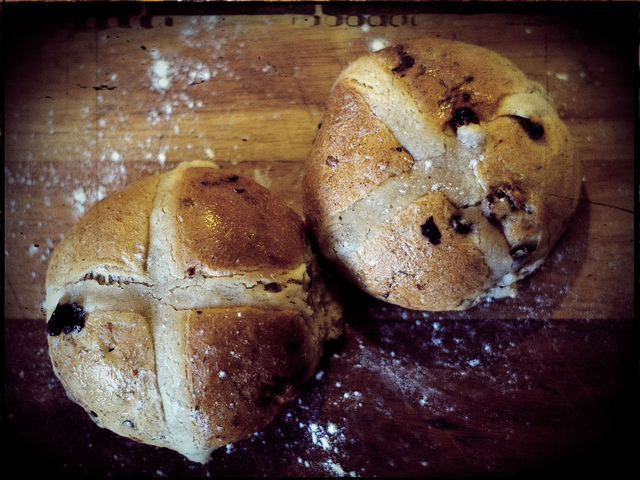To those participating in the Bishop In The Grove’s Bookclub reading of T. Thorn Coyle’s Make Magic of Your Life, join me on Twitter throughout the month of April and engage in a Twitter dialogue about the questions raised in this book. Be sure to @reply with the hashtag, #MakeMagic and Thorn’s handle, @ThornCoyle.
Now, onto today’s BITG post…
The Intersection of the Myth and the Meaning
My husband and I were standing in the kitchen, preparing a meal to take to my grandmother’s house for Easter. We were talking about the difference between Easter and Christmas, and how he had always preferred Christmas.
He talked about how the Jesus of Christmas and the Jesus of Easter seemed like two different people. To him, the lead-up to Christmas was always so intense and exciting, filled with anticipation. And the payoff, the birth of Christ, spoke to something wonderful about humanity. It was the moment in the myth when the divine became humble.
I’d never thought of it that way.
I proceeded to explain to him why Easter had always been more important to me than Christmas.
Easter brought into clarity how humans like me were in relationship with God. As a Christian, it made my station clear. It made the need for Jesus clear. It brought home the reason for being a Christian: reconciliation to God, and reconciliation to ourselves about our imperfect nature.
[Side note #1: I no longer hold this belief.]
Perhaps most importantly, Easter made the Christian myth relevant in the world. It provided me a way of applying the myth in my life. It said, “This thing happened, and because this thing happened you can better understand yourself. You can now go into the world and better understand the nature of the world.” Lent, the season preceding Easter, was equally important for me because it rooted the myth into my personal life, and encouraged in me a deep reflection on the parts of myself I often avoid acknowledging.
Christmas, on the other hand, was less visceral for me. Funny, right? Christmas is all about incarnation; about the divine being made human through birth — the most visceral act. Yet it did not feel as immediate or as potent as the Easter myth. Easter was about the complexity of humanity. Holy Week, even, provided all of these opportunities to reflect on the ways in which, in spite of all of our virtues, human beings do ghastly things to one another. It forced me to looks at my own potential for complicity in hatred and cruelty. It was humbling.
[Side note #2: It would be incorrect to dismiss this exploration of what Easter or Christmas meant to me in my early Christian life as “Christian baggage.” Having conversation about our past, or engaging with the stories which have been relevant to us at different times is not “baggage.” The term is reductive. I think we can be bigger than that.]
When I think about my proclivity toward inquiry about different ethical, and perhaps even moral convictions within the Pagan community, it is not because I believe in replicating a Christian-like, sin-based, transactional model of interaction with the divine; rather, it is because I have always believed that the stories you tell about the gods you worship need to be relevant in the world you live in. They must be more than just stories. They must have application.
I was never an advocate of literalism in the Church. I thought that was missing the point. The stories of Easter didn’t need to actually happen in order for them to be important or applicable. They could be symbolic while still being relevant.
And the point is that they were. Relevant.
So when I write about Pagan bubbles, or the effects of casting circle, or the function of love within a Pagan paradigm, I’m doing so because I am a person whose initial religious identity was heavily influenced by the idea that one’s religion must inform how they understand themselves in the world. I’m sure there are plenty of Pagans who can explain how their religious practices and mythologies directly influence their engagement with the world, and I’d like to hear from you here.
While the m-word (morality) may reek of wine and wafers and be stained with a duality that makes many of us cringe (myself included), the intersection of the myth and the meaning is where morality is born.
Is that correct? Can you find a way to phrase that last part more accurately?
But that’s beside the point of the original realization. Easter meant more to me because it made my myth into something I could apply in my life while informing me of my relationship to God. I may now see divinity as something different than I did then (and I do), but I still long to find, uncover, or create stories which make a similar connection. I’m not interested in finding the exact right one (I don’t think such a thing exists), but I am on a quest for meaning.
It all has to mean something, or it means nothing.

Leave a Reply